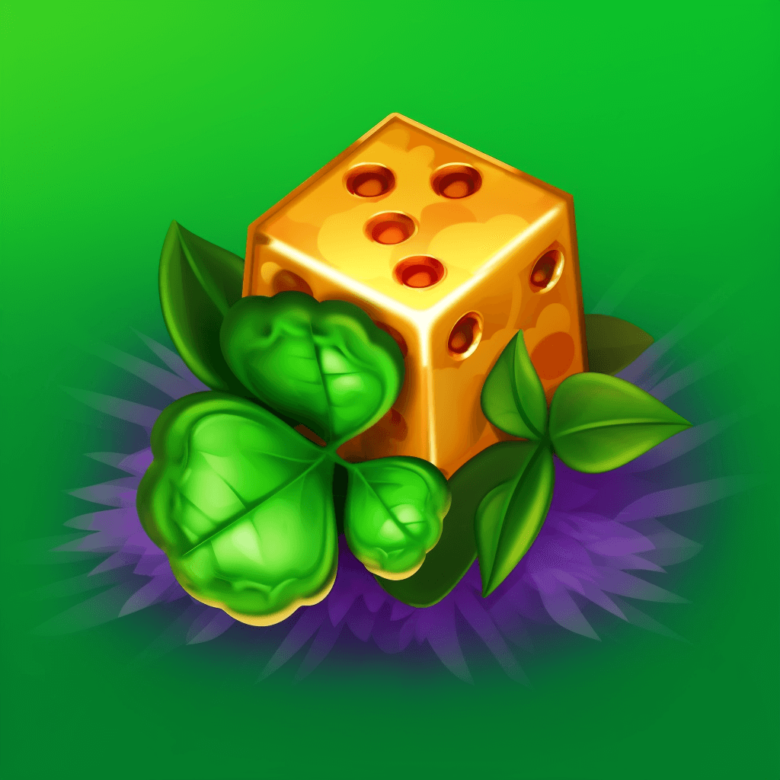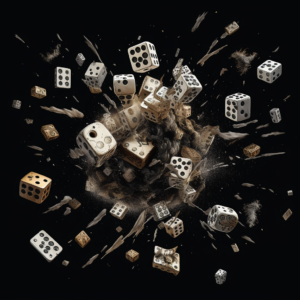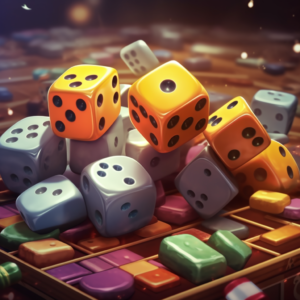Welcome to the intriguing world where chance meets strategy and psychology merges with gameplay. In this chapter, we embark on a journey to understand the profound role of luck in the realm of games and the allure of dice rolling that has captivated generations of gamers.
1.1. Understanding the Role of Luck in Games
Games, in their various forms, have been a part of human culture for centuries. From ancient board games to modern video games, they share a common thread – the element of luck. Luck, in the context of games, refers to the unpredictable and random events that can influence the outcome. It’s the roll of the dice, the draw of a card, or the spin of a wheel that can make or break a player’s strategy.
Understanding the role of luck in games is essential because it shapes not only the gameplay itself but also the emotions and decisions of the players. It adds an element of excitement, surprise, and sometimes frustration, making games a unique blend of skill and chance.
1.2. The Fascination with Dice Rolling
Among the many elements that bring luck into games, dice rolling stands out as one of the most iconic and captivating. Dice, simple six-sided cubes, hold immense power within the gaming world. The act of rolling dice carries with it a sense of anticipation, a moment where anything can happen. It’s a miniature drama unfolding in the palm of your hand.
Dice have a rich history, dating back thousands of years. They’ve been used for divination, decision-making, and, of course, gaming. Whether it’s the roll of dice determining the fate of armies in ancient battles or the outcome of a high-stakes board game with friends, dice have been a constant source of fascination.
1.3. Purpose and Scope of this Article
As we delve deeper into this article, our purpose is to explore the intricate relationship between luck and games. We will dissect the psychology behind luck perception, unravel the cognitive biases that influence our decisions, and investigate how luck impacts emotions during gameplay. We’ll also delve into strategies for managing luck, the social dynamics it creates, and the ethical considerations in game design.
By the end of this journey, you’ll have a comprehensive understanding of how luck shapes the world of gaming. Whether you’re a dedicated gamer, a game designer, or simply curious about the psychology of luck, this article aims to provide valuable insights and a deeper appreciation for the role of chance in the games we love.
So, let’s roll the dice and begin our exploration of “The Psychology of Luck and Dice Rolling in Games.”
The Science Behind Luck
Luck in games is not purely a matter of chance. It’s a complex interplay of psychology, statistics, and decision-making. In this chapter, we dive into the scientific foundations of luck, exploring how it’s defined in psychological terms and how cognitive biases can shape our perception of luck.
2.1. Defining Luck in Psychological Terms
Luck, in the context of psychology, is a fascinating concept. It encompasses the idea that seemingly random events can influence outcomes, both positively and negatively. Psychologists often define luck as the belief in a force or factor that can affect events independently of one’s own actions.
Luck as a Psychological Phenomenon
- Luck perception varies from person to person, influenced by individual beliefs and experiences.
- It’s often associated with superstitions, rituals, and lucky charms that people use to influence outcomes.
2.2. Cognitive Biases and Luck Perception
Cognitive biases are powerful mental shortcuts that can significantly impact how we perceive luck in gaming. Two prominent biases in this context are the hindsight bias and the confirmation bias.
2.2.1. The Hindsight Bias
The hindsight bias, also known as the “I knew it all along” phenomenon, is a cognitive bias that makes past events seem more predictable than they actually were.
- In gaming, this bias can lead players to believe that they could have predicted the outcome of a game or event after it has already occurred.
- It can influence how players evaluate their own decisions, attributing their success or failure to their own skills or lack thereof.
2.2.2. Confirmation Bias
Confirmation bias is the tendency to search for, interpret, and remember information in a way that confirms one’s preexisting beliefs.
- In gaming, this bias can lead players to selectively focus on instances where their beliefs about luck were confirmed while ignoring cases where luck played a different role.
- It can reinforce players’ superstitions and influence their future decisions in games.
2.3. Luck and Decision-Making
The concept of luck is intertwined with decision-making in gaming. Two prominent aspects of decision-making influenced by luck are the Gambler’s Fallacy and expected value.
2.3.1. The Gambler’s Fallacy
The Gambler’s Fallacy is the mistaken belief that if something happens more frequently than normal during a given period, it will happen less frequently in the future, or vice versa.
- In gaming, this fallacy can lead players to make suboptimal decisions based on the belief that the odds are “due” to change.
- It can affect betting strategies, causing players to bet more or less depending on recent outcomes.
2.3.2. Expected Value in Gaming
Expected value is a statistical concept used to assess the potential value of a decision in gaming.
- In gaming, players often calculate the expected value of their actions to make informed choices.
- It involves considering the probability of various outcomes and the potential rewards or losses associated with each.
Understanding these psychological and statistical aspects of luck is essential for both players seeking to improve their decision-making and game designers aiming to create engaging and balanced gaming experiences. In the following chapters, we’ll further explore how these elements interact with the world of games, providing valuable insights into the psychology of luck and dice rolling.
The Role of Dice in Games
Dice, those small and unassuming objects, hold an extraordinary power to shape the destiny of games. In this chapter, we’ll delve into the fascinating world of dice in gaming, exploring their history, the mathematics behind them, and their multifaceted role as game mechanics.
3.1. History and Evolution of Dice Games
Dice games have a storied past that stretches back millennia. From ancient civilizations to contemporary board games, dice have been a constant companion in the world of gaming.
The Ancient Origins
- Dice were first used in ancient Mesopotamia, around 3000 BCE, for divination purposes.
- They later evolved into tools for gambling and entertainment.
Dice Across Cultures
- Different cultures have embraced dice, creating their own unique games and variations.
- Dice have been used in everything from religious ceremonies to strategic war games.
3.2. Probability and Dice Rolling
The roll of the dice may seem arbitrary, but beneath that randomness lies a world of probability and mathematics.
Exploring the Mathematics of Dice
- Dice have a specific number of sides, usually six, but they can have more or fewer.
- Each side has an equal chance of landing face up, creating a uniform distribution.
Randomness vs. Pseudo-Randomness
- Modern technology has introduced the concept of pseudo-randomness, where algorithms simulate randomness.
- In gaming, the debate between true randomness and pseudo-randomness is ongoing.
3.3. Dice as Game Mechanics
Dice are not mere chance generators; they are integral to the mechanics of many games.
How Dice Add Excitement
- Dice introduce an element of unpredictability and excitement to gameplay.
- They can turn the tide of a game in an instant, keeping players engaged.
Dice in Strategy vs. Luck-Based Games
- In some games, like chess, skill reigns supreme, and luck plays no part.
- In contrast, games like Monopoly heavily rely on dice to determine movement and outcomes.
Understanding the rich history, mathematics, and gameplay dynamics of dice is essential for any gamer. Whether you’re a board game enthusiast, a tabletop RPG player, or a casual gamer, the role of dice in shaping your gaming experiences is undeniable. As we continue our exploration, we’ll uncover more about the intricate relationship between luck, psychology, and the world of games.
Luck and Player Emotions
In the world of gaming, emotions are like the unpredictable roll of the dice—sometimes you’re on top of the world, and other times, you’re left wondering where it all went wrong. In this chapter, we delve into the rollercoaster of emotions that players experience as luck wields its capricious influence.
4.1. The Rollercoaster of Emotions
Playing games is more than just moving pieces on a board or making digital choices; it’s an emotional journey that can swing from exhilaration to frustration in a matter of seconds.
The Thrill of Success
- Success in gaming, especially when luck plays a role, can be an adrenaline rush.
- That unexpected critical hit or last-minute victory can bring euphoria and a sense of accomplishment.
Dealing with Frustration
- On the flip side, the frustration of a bad roll or an unfavorable card draw can be palpable.
- Players may experience disappointment, anger, or a desire for redemption.
4.2. Skill vs. Luck Balance
The balance between skill and luck varies from game to game. Some games are predominantly skill-based, where player decisions are paramount. Others lean heavily on luck, where outcomes are determined by the roll of the dice.
Finding the Right Balance
- Game designers carefully consider the mix of skill and luck to create the desired player experience.
- Striking this balance is essential to keep players engaged and challenged.
4.3. The Impact of Luck on Player Engagement
Luck plays a vital role in keeping players engaged and invested in their gaming experiences.
The Element of Surprise
- Luck introduces an element of surprise and uncertainty that makes each game unique.
- Players never know exactly how luck will influence the outcome, adding excitement and replayability.
Maintaining Engagement
- Games that skillfully incorporate luck can maintain player engagement over the long term.
- The unpredictability of luck keeps players coming back for more, seeking to master both the skill and the chance elements.
Understanding the emotional journey that players embark on when luck is in the equation is crucial for game designers and players alike. Emotions are an integral part of the gaming experience, and recognizing how luck influences them can enhance our appreciation for the art and science of gaming. As we proceed in this exploration of luck in gaming, we’ll uncover strategies for managing luck and the intricate social dynamics it fosters.
Strategies for Managing Luck
Luck in games can be a fickle friend, capable of turning the tide in an instant. But for those seeking to tip the scales in their favor, there are strategies to navigate the unpredictable terrain of chance. In this chapter, we explore the art of managing luck in gaming.
5.1. Luck Mitigation Techniques
When luck is a significant factor in a game, players often look for ways to mitigate its impact and enhance their chances of success.
Strategy and Tactics
- Developing a sound strategy is one of the most effective ways to counterbalance luck.
- Skillful planning and decision-making can minimize the influence of random events.
Resource Management
- Careful management of in-game resources, whether they are virtual currency, cards, or tokens, can provide a buffer against unfavorable luck.
- Wise resource allocation can help players adapt to changing circumstances.
5.2. Enhancing Luck Through Psychology
While luck itself is random, players can influence their perception of luck and, to some extent, the outcomes through psychological techniques.
Visualization Techniques
- Visualization involves mentally rehearsing positive outcomes and focusing on desired results.
- This practice can enhance confidence and resilience in the face of setbacks.
Positive Thinking in Gaming
- Maintaining a positive attitude can improve decision-making and resilience when dealing with unfavorable luck.
- It can also foster a more enjoyable gaming experience.
5.3. Understanding the “Hot Hand” Phenomenon
The “hot hand” phenomenon is a psychological belief that a player who has experienced success in recent plays is more likely to continue succeeding.
- While statistically debated, the perception of a “hot hand” can influence player behavior and strategies.
- Recognizing and managing this belief is essential for players aiming to make rational decisions.
As you delve into the realm of luck in gaming, mastering these strategies for managing luck can be a game-changer. Whether you’re aiming to minimize the impact of chance or seeking to harness luck to your advantage, the knowledge and techniques explored in this chapter will be valuable tools in your gaming arsenal. In the chapters ahead, we’ll unravel the social dynamics of luck in gaming and explore the ethical considerations that shape the design of games influenced by chance.
The Social Aspect of Luck in Gaming
Gaming is not just a solitary pursuit; it’s a social activity that brings people together. In this chapter, we’ll explore the intricate social dynamics that luck introduces into the world of gaming and how it influences interactions among players.
The Luck Conversation Starter
Luck has the remarkable ability to break the ice and spark conversations among gamers.
- Sharing tales of incredible luck or unfortunate rolls is a common way for players to connect.
- It creates a sense of camaraderie and shared experiences, even among strangers.
Luck as a Social Lubricant
In multiplayer games, luck can serve as a social lubricant, smoothing the edges of competition.
- It provides moments of levity and shared laughter when improbable events occur.
- Luck can reduce tension and create a more enjoyable gaming atmosphere.
Luck in Competitive vs. Cooperative Games
The impact of luck varies in competitive and cooperative games, shaping the dynamics of player interactions.
Competitive Games
- In competitive games, luck can lead to rivalries and friendly banter.
- It adds an element of unpredictability, making each game unique.
Cooperative Games
- In cooperative games, luck can foster a sense of teamwork.
- Players collaborate to overcome challenges and share in both triumphs and setbacks.
Understanding the social aspect of luck in gaming is vital for game designers, as it can influence how players experience and enjoy games. Whether you’re playing with friends, family, or fellow enthusiasts, the role of luck in shaping social interactions adds a fascinating layer to the world of gaming. As we look to the future of luck in gaming, we’ll explore how technology and evolving player preferences may impact these social dynamics.




